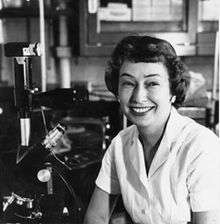Charlotte Friend
| Charlotte Friend | |
|---|---|
 | |
| Born |
March 11, 1921 New York City, New York |
| Died |
January 13, 1987 (aged 65) New York, New York |
| Residence | New York, New York |
| Nationality | U.S. |
| Fields | Virology |
| Institutions | New York University, Sloan-Kettering Institute for Cancer Research |
| Alma mater | Hunter College, Yale |
| Known for | Discovery of the Friend Leukemia Virus and Friend erythroleukemia cells, her research is still widely used today. It has become especially important in the field of HIV/AIDS research following her death. |
Charlotte Friend (March 11, 1921 – January 13, 1987) was an American virologist. She is best known for her discovery of the Friend leukemia virus.[1] She helped to establish the concept of the oncovirus, studied the role of the host immune response in disease development, and helped define modern retrovirology.
Biography
Born and raised in New York, she was the youngest daughter of Russian emigrants. She graduated from Hunter High School and Hunter College in New York City and enlisted in the United States Navy in 1943.[2] As a lieutenant junior grade she worked in the hematology laboratory at U.S. Naval Hospital Shoemaker, California.[2] After the war ended she enrolled as a graduate student in the Department of Microbiology at Yale, where she received her PhD in 1950 with a thesis on the effects of sodium salicylate (aspirin) on antigen-antibody reactions[3] During her time at Yale she frequently traveled to New York to consult with Elvin Kabat and Michael Heidelberger, imminent immunologists at Columbia.[3] As a post-doc she worked in the Sloan-Kettering Institute under the direction of Cornelius P. Rhoads. While at Sloan-Kettering, she met Cecily Cannan Selby, who had recently gotten her Ph.D. from the Massachusetts Institute of Technology. Both of them were interested in cell structure. Once, when looking through an unused electron microscope at the university, the two decided to look at fine structures within the cells of the Ehrlich ascites carcinoma, a commonly used model for cancer research. What they found were structures in the cytoplasm of the cells which resembled those found in virus-infested cells. It was this incident that sparked Friend's interest in the possibility of cancer being caused by viruses, which became a main focus of her research. In 1966 she accepted a position as Professor and Director of the Center for Experimental Cell Biology at The Mount Sinai Hospital.
During her lifetime she was President of the Harvey Society, the American Association for Cancer Research and the New York Academy of Sciences and was the first woman to do so.[3] Charlotte Friend also served as a member of the Advisory Committee for the Virus Cancer Program of the National Institutes of Health and a member of the Board of Scientific Counselors of the Division of Cancer Cause and Prevention of the National Cancer Institute. Over the years, she served on a number of other advisory committees and on the editorial boards of several cancer and hematology journals. In all, she published 163 papers, 70 of which she wrote by herself or with one other author.
On her sixtieth birthday she was diagnosed with a lymphoma. She was insistent that her diagnosis remain secret, and continued to carry out her duties in her laboratory.[3] She died at the age of 65.
Legacy
- Cemented the knowledge that virus can be responsible for some types of cancer.
- Friend Virus is today the model to study viral leukemogenesis [4]
- Helped set the foundations for the study of retrovirus. Her techniques and characterisation studies allowed the future isolation of the human immunodeficiency virus.
- Observed the relation between liver cell damage and virus release and elevation of enzyme levels. Furthermore, she detected that increases in serum enzymes are also a feature of some human leukaemia, both still of vital clinical relevance today.[5]
Prizes
- 1962 Alfred P. Sloan Award in Cancer Research
- 1986 Honorary Doctor of Science, Brandeis University
Selected works
- “Cell-Free Transmission in Adult Swiss Mice of a Disease Having the Character of a Leukemia.” Journal of Experimental Medicine 105 (1957): 307–318[2]
- “The Coming of Age of Tumor Virology.” Cancer Research 37 (1977): 1255–1263[2]
- “Hemoglobin Synthesis in Murine Virus-induced Leukemic Cells in Vitro: Stimulation of Erythroid Differentiation by Dimethyl Sulfoxide,” with W. Scher, J.G. Holland, and T. Sato. Proceedings of the National Academy of Sciences 68 (1971): 378–382.[2]
References
- ↑ Cell-free transmission in adult Swiss mice of a disease having the character of a leukemia. J. Exp. Med. 105:30718.
- 1 2 3 4 5 Diamond, Leila. "Charlotte Friend". Jewish Women's Archive. Retrieved December 31, 2014.
- 1 2 3 4 Diamond, Leila (1994). "Biographical Memoirs (vol.63): Charlotte Friend" (PDF). The National Academies Press. Retrieved December 31, 2014.
- ↑ L. Diamond and S. R. Wolman, eds., "Viral Oncogenesis and Cell Differentiation: The Contributions of Charlotte Friend." (Ann. N.Y. Acad. Sci. 567, 1989).
- ↑ Friend, C; Wroblewski, F; LA, DUE JS (1955). "Glutamic-oxaloacetic transaminase activity of serum in mice with viral hepatitis". J. Exp. Med. 102: 699–704. doi:10.1084/jem.102.6.699. PMC 2136542
 . PMID 13271682.
. PMID 13271682.
External links
- BIOGRAPHICAL MEMOIRS
- Charlotte Friend Papers at The Mount Sinai Archives, The Mount Sinai Medical Center, New York, N.Y.